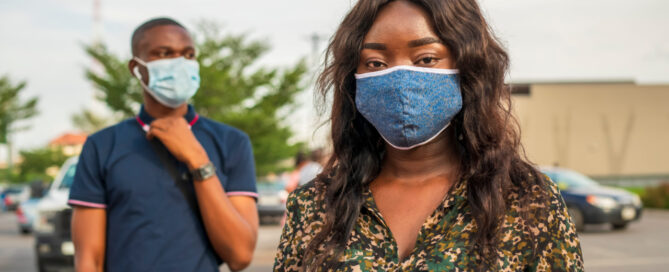
Reducing Social Stigma: Lessons Learned from COVID-19 and MPX
Just as the country gains a grip on COVID-19 cases, another outbreak is bubbling across the country. In May of this year, the U.S. documented its first 2022 outbreak case of monkeypox, which is a zoonotic condition endemic in several West and Central African countries. As of September 6th, the U.S. has nearly 20,000 cases of monkeypox and that number is steadily increasing. According to the CDC, current data suggests that gay, bisexual, and other men who have sex with men (MSM) make up the majority of cases in the current monkeypox outbreak. In fact, in states like Georgia, about 80% of the state’s confirmed monkeypox cases are Black, over half of them are HIV positive, and a fair number of diagnosed patients also have concurrent sexually transmitted diseases, like herpes and chlamydia.
Over the last few years, public health officials received harsh public criticism for their response to the COVID-19 pandemic. In the last few weeks, public health leadership has admitted to making COVID mistakes along the way, but they are not alone in making errors. Presently, the Department of Health and Human Services is scrambling to order and distribute monkeypox vaccines, after failing to put in enough bulk orders with manufacturers. According to federal agencies, a bulk of the vaccines won’t be received until next year, meaning the country will be operating with a third of the projected doses needed to adequately counter an outbreak.
Although things are off to a shaky start, public health and other federal officials say they are committed to using previous pandemic blunders to revamp their approach to monkeypox and other future public health threats. But what are some of the hard lessons we can think through and remedy as individual practitioners and organizations?
- With data driving the direction of public health efforts, practitioners and state health departments have been prioritizing limited monkeypox vaccine allotments for high-risk groups–meaning gay and bisexual men and transgender folx. But in doing the work of tracking and monitoring patterns in monkeypox cases, it’s important to recognize the stigmatization LGBTQ+ people may likely be facing because of public communication about how they are overrepresented in caseloads. And unlike COVID-19, monkeypox is a visible condition that creates blisters all over the skin. This means that there are LGBTQ+ folx dealing with homophobia, experiencing a minoritized identity, and enduring the visible shame of monkeypox; this can be compounded even further for LGBTQ+ people who are BIPOC and housing or income insecure. For this reason, we as public health professionals engaging in active health promotion and prevention must be:
- sensitive and protective in our framing about who is being deeply impacted by monkeypox.
- transparent about why public health officials have vaccine shortages.
- and conscious in how we communicate why the public health field is triaging its limited resources for MSM. This is especially important when having conversations with the general public and/or members outside of the high-risk demographic.
- Limited monkeypox vaccine availability has made access an exercise in hunger game-level effort. This looks like vaccine appointments filling up in minutes, websites crashing during appointment windows, long queues at health departments, and waitlisted availability. But how could we make monkeypox vaccines available in a more equitable manner rather than functioning like a lottery system? Is there a way to use contact tracing to prioritize communities at a greater risk? Can health departments with lower caseloads send supplies to overtaxed areas? Are there non-profits or other health organizations that health departments can partner with to reach more vulnerable subgroups?
- Another important consideration with monkeypox is that it requires a 21-day isolation period. COVID-19 quarantine periods were a challenging time for many people around the world, especially when it came to maintaining good mental health, while social distancing from loved ones. Even COVID-19 research affirms that It can be difficult to mentally grapple with restrictive and mandatory lockdowns and this is likely made more difficult with the world opening back up. There are also individuals who simply cannot afford to quarantine from work or do not work for employers that allow them to work from home. Although it is important to remove oneself from the cycle of infection to stop the spread, there are obvious financial risks to getting tested, diagnosed and having to isolate for such a long period. However, health departments, nonprofits, and other city and state officials can help fill in the gap by taking inventory of existing programming and funding. Are there areas where funding or COVID-19 resources can be rerouted to provide financial assistance or support for individuals with monkeypox? Are there programs that can help support employers that have employees who are isolating? What social services can be reallocated for areas that fall outside the traditional public health scope? Now that we’ve experienced a global pandemic, is there an opportunity to rethink HR policies on sick leave, health insurance coverage, or 401K access for those financially impacted by a public health threat?
Pandemics and outbreaks are scary, but just like the rest of the world, health practitioners are just as susceptible to many of the conditions we work to prevent. So in order to humanize the profession and be more responsively empathetic to those experiencing the pangs of new public health threats, we must be committed to stepping outside traditional public health approaches and be willing to collaborate widely to create pathways of relevant support.
Portions of this blog post were informed and inspired by a conversation curated by Impulse Group Atlanta, a chapter organization, based in Atlanta, Georgia, dedicated to the advancement of HIV education, safe sex awareness and practice among gay men. In collaboration with the AIDS Healthcare Foundation. Many thanks to the featured guest from the Georgia Department of Public Health for their necessary insights:
- Michelle L. Allen, Section Director of Community Outreach & Partnerships
- Dr. Cherie Drenzek, Georgia’s state epidemiologist
- Alex Millman, Chief Medical Officer and Director of Medical and Clinical Services
